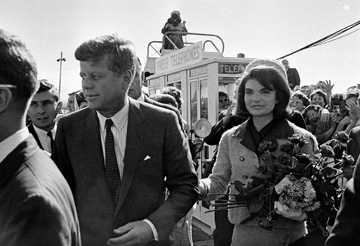
The first time I visited The Sixth Floor Museum, I was 10 years old. The trip was a privilege that many local public schools afforded their 5th graders, and we were thrilled to spend the day away from classes to visit “the city.” I have few memories of the visit itself–the image that jumps out at me most from that day is going to Spaghetti Warehouse afterward and watching my friend Chris try to eat pasta with his nose. For me, it never even clicked that the reason why we had this museum in Dallas was because President Kennedy’s assassination occurred just a few feet away.
Since beginning college, I’ve taken more classes on the history of Dallas and the Kennedy assassination than I ever thought possible, so the museum has become a regular hangout. The word “dictabelt” has become a shibboleth for entering conversations about conspiracy theories. I feel like I know so much about that day, and yet I can’t shake my doubts about the constant emotional alienation from the event I’ll always feel.
A couple of years ago, I was a groomsman at my sister’s wedding. The photographer took us all around downtown with the bride and groom for photo opportunities. At one point, she asked the bus driver to stop so we could “take a picture in front of that big Lego sculpture.” I opted to chuckle rather than loudly ask, “You mean the JFK
Memorial sculpture?”
The photographer was only a few years older than me, so I could understand why she might not know what that sculpture was or why it has so much emotional resonance for people who remember that day almost 50 years ago.
I’ve interviewed patrons at The Sixth Floor Museum, and, without fail, the people who offer the most glowing reviews are the ones old enough to remember what they were doing on Nov. 22, 1963. The museum’s guestbook always contains testimonials attesting to JFK’s brilliance and the tragic nature of his death.
Historical discourse surrounding JFK’s presidency has gone from overwhelmingly positive to pessimistically neutral. Kennedy, who was once regarded as a hero of the civil rights movement and an effective diplomat, has largely fallen out of favor in many academic circles. Historians fault him for vacillating so long on equal rights for African Americans, and there is little proof that Kennedy would not have made many of the same mistakes Lyndon B. Johnson did
in Vietnam.
And yet this cult of personality still persists. It’s hard to imagine any public figure being so consistently lionized today, nor could a reaction to that figure’s death ever quite be the same. In 1963, Walter Cronkite had the whole country glued to their TV screens as he told the world of Kennedy’s fate; today, we would likely discover such a tragedy by iPhone push notification.
In an age where a president can barely swat a fly without facing media scrutiny, it’s nearly impossible for young people to imagine a world where one person could be so consistently admired. Perhaps we might laud a more scrutinizing media giving us clearer portraits of our public officials. Or perhaps we’ve grown so in love with the sound of our own opinions that we’ve drowned out any dissenting voices. Regardless, I look forward to taking some time Friday to reflect upon a president taken too soon and a zeitgeist we can
never reclaim.
Bub is a senior majoring in history, English and political science.








